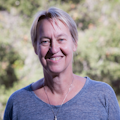E. Virginia Armbrust, Ph.D.
Co-Director, SCOPEProfessor, University of WashingtonE. Virginia Armbrust’s website

SCOPE-ALOHA Project: Phytoplankton-based networks in the North Pacific Ocean
Marine ecosystems consist of interconnected networks of microbial species, most of which have not yet been cultured in the laboratory. Our focus is on the photosynthetic marine phytoplankton and their interactions with other microbes. Open ocean phytoplankton communities consist largely of cyanobacteria and eukaryotic picoplankton, with aperiodic blooms of eukaryotic diatoms that often possess symbiotic nitrogen-fixing cyanobacteria. This project will combine laboratory-based studies of model species with field-based genomics and flow cytometric approaches to determine how microbial synergisms and non-equilibrium environmental conditions impact the growth and loss of different members of the phytoplankton community. The goal is to develop a mechanistic understanding of the role of biotic and abiotic factors in shaping the flow of carbon via the photosynthetic base of marine food webs.
SCOPE-Gradients Project: Model-driven investigations of ocean transition zones
The transition zones between the North Pacific subtropical gyre and neighboring ecosystems exhibit gradients in environmental conditions associated with dramatic changes in the microbial ecosystem, providing venues to understand mechanisms that structure microbial communities and to test ecological theory. E. Virginia Armbrust is the director of the overall project, and her lab will contribute with respect to flow cytometry, phytoplankton community composition and particle size distribution, organism-specific growth and mortality, and metatranscriptome analyses.
CBIOMES Project: Data and tools to define the biogeography of marine microbes
Marine microbes constitute a vast ecosystem that together generate and recycle nearly half the organic carbon produced on Earth each year. Our goal within CBIOMES is to develop data and software tools to help characterize the global distributions of these organisms at basin and seasonal scales and to identify the environmental drivers of these distributions. We take three general approaches to achieve these goals. First, we developed an open-source data portal named Simons Collaborative Marine Atlas Project that brings together into a single place publicly available marine data to help uncover microbial biogeography. Second, we use observation data generated from a ship-board automated flow cytometer we invented called SeaFlow to test predictions generated by mechanistic models. SeaFlow has been used to create maps of the abundance and characteristics of individual phytoplankton on ~100 research cruises spanning hundreds of thousands of kilometers of the surface ocean. Third, we use statistical approaches to analyze molecular data from natural communities of microbes to identify adaptations to environmental conditions.
Bio:
E. Virginia Armbrust is the Richard H. Fleming Endowed Professor of Oceanography at the University of Washington. She received her B.A. from Stanford University and her Ph.D. from the Massachusetts Institute of Technology and Woods Hole Oceanographic Institution. Prior to joining the faculty at the University of Washington, she was a postdoctoral researcher at Washington University in St. Louis where she trained in molecular genetics. Armbrust’s research focuses on the molecular ecology and physiology of marine phytoplankton as these microscopic organisms are responsible for about half the organic matter and oxygen generated on Earth each year. Her lab uses laboratory experiments and field studies to understand how different forces shape the diversity and productivity of marine microbial communities in current and future oceans. She has decades of experience conducting research at sea and in recent years has led several multi-lab research cruises in the North and Equatorial Pacific Ocean. Her work incorporates molecular and optical-based approaches with model organisms in the lab and natural communities at sea. Her lab group invented a ship-board instrument that generates fine scale maps of phytoplankton abundance and growth rates and has developed new software tools as needed. Armbrust is a Fellow of the American Academy of Microbiology and the American Association for the Association for the Advancement of Science. She is a member of the Washington State Academy of Science.